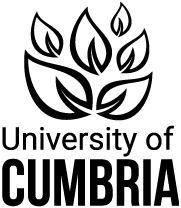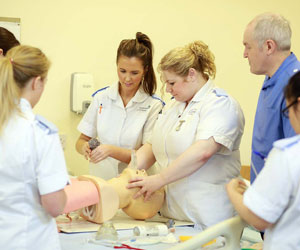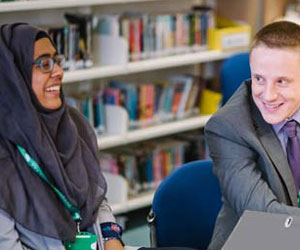In the case of the DPS Practice Development, you will be required to have completed the following modules:
- Core module: Evidence Based Practice (20 credit)
- Core module: Communication Skills in Health and Social Care (20 credit)
- Core Module: Collaborative Working in Health and Social Care (20 credit)
The remaining credits may be selected from the list of optional modules to a total of 120 credits. The dedicated list of optional modules reflects the diverse roles and responsibilities of students and the wide range of health, wellbeing and social care settings within which they work. All modules must be relevant to your area of practice and target award, and agreed in your personal tutor.
Graduate destinations
After completion of this programme you'll be prepared to pursue a career at a more senior level. Following completion of Level 5 study, the framework facilitates seamless progression to Level 6 study including the BSc (Hons) Practice Development.
Course outline
Course summary
Our long-established Practice Development Framework comprises tailor-made continuing professional development (CPD) for all healthcare professionals as well as unregistered staff working in the health, wellbeing and social care sector. Programmes within the framework have been designed to meet the needs of anyone interested in developing their professional and personal knowledge and expertise to develop excellence in practice within community, workplace and health and social care settings.
The course contains 3 core modules which may be interspersed with optional modules relevant to your area of practice. Typically 1 module per semester will be studied over a 2 year period.
Modules
Year One
Optional Modules can be chosen from the Practice Development Timetable.
Year 1 modules are likely to include 1 or more of the Core modules.
- Core module: Evidence Based Practice (20 credit)
- Core module: Communication Skills in Health and Social Care (20 credit)
- Core Module: Collaborative Working in Health and Social Care (20 credit)
Optional Modules include:
- Understanding Autism
- Supporting Individuals on the Autism Spectrum
- Working With Individuals on the Autism Spectrum
- Disaster Response
- Safety and Security for Humanitarian, Disaster Response and Development Workers
- Humanitarian Action
- Consultation and Physical Examination: Health Assessment Skills
- Care of Minor Illness and Minor Injuries
- Managing Self and Others
- Clinical Complexity in Emergency Care
- Clinical Reasoning and Assessment Skills in Healthcare (CRASH)
- Emergency Care of Women and Children
- Emergency Clinical Decision Making and Problem Solving
- Foundations in Health and Physiology
- Advancing Mental Health Across The Healthcare Spectrum (Introductory Level)
- Negotiated Learning
- Work Based Learning
Year Two
Optional Modules can be chosen from the Practice Development Timetable.
Year 2 modules are likely to include 1 or more of the Core modules.
- Core module: Evidence Based Practice (20 credit)
- Core module: Communication Skills in Health and Social Care (20 credit)
- Core Module: Collaborative Working in Health and Social Care (20 credit)
Optional Modules include:
- Understanding Autism
- Supporting Individuals on the Autism Spectrum
- Working With Individuals on the Autism Spectrum
- Disaster Response
- Safety and Security for Humanitarian, Disaster Response and Development Workers
- Humanitarian Action
- Consultation and Physical Examination: Health Assessment Skills
- Care of Minor Illness and Minor Injuries
- Managing Self and Others
- Clinical Complexity in Emergency Care
- Clinical Reasoning and Assessment Skills in Healthcare (CRASH)
- Emergency Care of Women and Children
- Emergency Clinical Decision Making and Problem Solving
- Foundations in Health and Physiology
- Advancing Mental Health Across The Healthcare Spectrum (Introductory Level)
- Negotiated Learning
- Work Based Learning
Programme Specification
Programme specification (PDF)
Assessment, Feedback, and Teaching and Learning methods
Full details are available in the programme specification.
Timetables
The teaching timetable should be available from the end of August. Access to the timetable is through the Student Hub – you will be able to access the Student Hub after you have completed online registration. The teaching day is 9am to 6pm, Monday to Friday; please keep your other commitments open until confirmation of your teaching timetable, and bear in mind that many courses will offer placements or fieldwork which sometimes extends into the evenings and weekends.
Entry requirements
Have a question about our entry requirements?
Entry Requirements
HEFCE - GEN - Short course
The decision to offer a place on the programme is at the discretion of the programme leader There is full commitment to equal opportunities criteria. The University is committed to widening access by taking candidates from a variety of educational backgrounds, without compromising academic standards. The following additional requirements apply for entry to this programme: Applicants must have experience of working in a health, wellbeing, social care or appropriate setting. All applicants must complete a pre-entry study skills package such as HeadStart if they are new to this level of study or have had a break from study for a period of 4 years
Selection criteria
The decision to offer a place on the programme is at the discretion of the programme leader There is full commitment to equal
opportunities criteria. The University is committed to widening access by taking candidates from a variety of educational backgrounds, without compromising academic standards. The following additional requirements apply for entry to this programme: Applicants must have experience of working in a health, wellbeing, social care or
appropriate setting. All applicants must complete a pre-entry study skills package such as HeadStart if they are new to this level of study or have had a break from study for a period of 4 years
Application information
See program specification
Student finance
We have a wide range of scholarships, bursaries, grants and funds available to support you throughout your studies with us. This includes the Cumbria Bursary - a non-repayable bursary designed to support first year students with a household income of less than £25,000..
Student Finance Tuition Fee PolicyResources and facilities
As one of the UK's leading health departments, you can be confident that our high-quality courses are supported by expert academic and clinical practice staff to support your studies. You'll enjoy great facilities and professional advice to ensure a speedy route into employment.






